Adolescent family planning: Policy tracing for sexual and reproductive health and rights

Adolescent contraception is essential to reduce maternal mortality, which is particularly high in Sub-Saharan Africa. However, good evidence and rational arguments for providing contraceptive services to adolescents often fail to translate into national laws and policies that support contraceptive provision and use. For example, a simple reading of policy documents reveals that Uganda’s policy focuses on ‘value based’ abstinence for adolescents and access to contraceptives for married adolescents over a certain age, while Kenya’s policy takes a rights-based approach to adolescent family planning and permits the use of contraceptives by all adolescents regardless of their age or marital status. Curiously, these countries’ policy choices diverge despite their many demographic, social, political, legal, and economic similarities. It is unclear to what extent the binding laws and guiding policies in these countries uphold contraceptive availability, accessibility, acceptability, and quality standards in WHO’s guidance for ensuring human rights in the provision of contraceptive information and services. Moreover, the determinants influencing Uganda and Kenya’s respective policy choices are not well understood.
Funding agencies
Global Minds Post Doctoral Operating Grant van VLIR-UOS en het Belgisch Agentschap voor Ontwikkelingssamenwerking.
Team
Dr. Katrina Perehudoff; Prof. Kristien Michielsen; Mevr. Caoimhe Cotter (2019); Mevr. Elke Wuyts (2019);
Coordinator
Universiteit Gent, ICHR
Partners
Mbarara University of Science and Technology; Coalition for Health Promotion & Social Development (HEPS Uganda); Centre for Food and Adequate Living Rights; Academic Network on Sexual and Reproductive Health and Rights Policy;
Period
January 01, 2019 - November 30, 2021
Project status
Project ongoing
Countries
Themes
Adolescent and youth health
Family planning and contraception
Policy analysis

